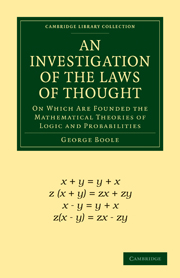 An Investigation of the Laws of Thought
An Investigation of the Laws of Thought Book contents
- Frontmatter
- PREFACE
- Contents
- CHAPTER I NATURE AND DESIGN OF THIS WORK
- CHAPTER II SIGNS AND THEIR LAWS
- CHAPTER III DERIVATION OF THE LAWS
- CHAPTER IV DIVISION OF PROPOSITIONS
- CHAPTER V PRINCIPLES OF SYMBOLICAL REASONING
- CHAPTER VI OF INTERPRETATION
- CHAPTER VII OF ELIMINATION
- CHAPTER VIII OF REDUCTION
- CHAPTER IX METHODS OF ABBREVIATION
- CHAPTER X CONDITIONS OF A PERFECT METHOD
- CHAPTER XI OF SECONDARY PROPOSITIONS
- CHAPTER XII METHODS IN SECONDARY PROPOSITIONS
- CHAPTER XIII CLARKE AND SPINOZA
- CHAPTER XIV EXAMPLE OF ANALYSIS
- CHAPTER XV OF THE ARISTOTELIAN LOGIC
- CHAPTER XVI OF THE THEORY OF PROBABILITIES
- CHAPTER XVII GENERAL METHOD IN PROBABILITIES
- CHAPTER XVIII ELEMENTARY ILLUSTRATIONS
- CHAPTER XIX OF STATISTICAL CONDITIONS
- CHAPTER XX PROBLEMS ON CAUSES
- CHAPTER XXI PROBABILITY OF JUDGMENTS
- CHAPTER XXII CONSTITUTION OF THE INTELLECT
- ERRATA
CHAPTER XXII - CONSTITUTION OF THE INTELLECT
Published online by Cambridge University Press: 05 November 2011
- Frontmatter
- PREFACE
- Contents
- CHAPTER I NATURE AND DESIGN OF THIS WORK
- CHAPTER II SIGNS AND THEIR LAWS
- CHAPTER III DERIVATION OF THE LAWS
- CHAPTER IV DIVISION OF PROPOSITIONS
- CHAPTER V PRINCIPLES OF SYMBOLICAL REASONING
- CHAPTER VI OF INTERPRETATION
- CHAPTER VII OF ELIMINATION
- CHAPTER VIII OF REDUCTION
- CHAPTER IX METHODS OF ABBREVIATION
- CHAPTER X CONDITIONS OF A PERFECT METHOD
- CHAPTER XI OF SECONDARY PROPOSITIONS
- CHAPTER XII METHODS IN SECONDARY PROPOSITIONS
- CHAPTER XIII CLARKE AND SPINOZA
- CHAPTER XIV EXAMPLE OF ANALYSIS
- CHAPTER XV OF THE ARISTOTELIAN LOGIC
- CHAPTER XVI OF THE THEORY OF PROBABILITIES
- CHAPTER XVII GENERAL METHOD IN PROBABILITIES
- CHAPTER XVIII ELEMENTARY ILLUSTRATIONS
- CHAPTER XIX OF STATISTICAL CONDITIONS
- CHAPTER XX PROBLEMS ON CAUSES
- CHAPTER XXI PROBABILITY OF JUDGMENTS
- CHAPTER XXII CONSTITUTION OF THE INTELLECT
- ERRATA
Summary
1. What I mean by the constitution of a system is the aggregate of those causes and tendencies which produce its observed character, when operating, without interference, under those conditions to which the system is conceived to be adapted. Our judgment of such adaptation must be founded upon a study of the circumstances in which the system attains its freest action, produces its most harmonious results, or fulfils in some other way the apparent design of its construction. There are cases in which we know distinctly the causes upon which the operation of a system depends, as well as its conditions and its end. This is the most perfect kind of knowledge relatively to the subject under consideration. There are also cases in which we know only imperfectly or partially the causes which are at work, but are able, nevertheless, to determine to some extent the laws of their action, and, beyond this, to discover general tendencies, and to infer ulterior purpose. It has thus, I think rightly, been concluded that there is a moral faculty in our nature, not because we can understand the special instruments by which it works, as we connect the organ with the faculty of sight, nor upon the ground that men agree in the adoption of universal rules of conduct; but because while, in some form or other, the sentiment of moral approbation or disapprobation manifests itself in all, it tends, wherever human progress is observable, wherever society is not either stationary or hastening to decay, to attach itself to certain classes of actions, consentaneously, and after a manner indicative both of permanency and of law.
- Type
- Chapter
- Information
- An Investigation of the Laws of ThoughtOn Which Are Founded the Mathematical Theories of Logic and Probabilities, pp. 399 - 424Publisher: Cambridge University PressPrint publication year: 2009First published in: 1854


